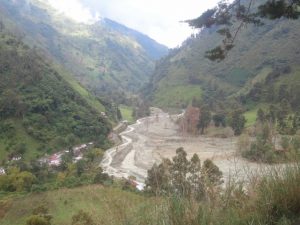The 2011 floods and droughts in the Magdalena river basin triggered the Colombian government and water institutions to enforce the attention given to water security and dike safety. To improve the capacities of Colombia for adaptation of water management to climate change pilot projects were started in one small and one large pilot basin. The activities that were undertaken as part of this pilot project include analysis of historical climate from observations and future climate with downscaled General Circulation Models (GCMs). Historical flood extents and land use were analyzed and a hydrological model was developed to assess climate impacts on water availability and flood frequency and extent. A water allocation model was developed to analyze how current and future water supply relate to sectorial water demands. Adaptation tipping points were determined and effects of different adaptation pathways were evaluated.
In 2011 Colombia, and especially the Magdelena river, was severely hit by large floodings. At the same time drought was experienced in other parts of the river basin. This triggered the Colombian government and water institutions to enforce the attention given to water security and dike safety and opened opportunities for the Dutch government and companies to support the country.
The main project objective is to improve the capacities of Colombia for adaptation of water management to climate change, by:
- Quantifying the impact of climate change on flood risk and water availability.
- Identifying critical thresholds in the water system and its management (adaptation tipping points) and sketch future options (pathways) for adaptation.
- Providing tools/approaches that support water resources (adaptation) planning processes in dealing with uncertainties of climate change and other future developments in small and large river basins.
- Demonstrating the above for a small (Coello-Combeima) and large (Magdalena) pilot basin and organizing capacity building activities.
- Exploring opportunities for upscaling within Colombia and other countries in Latin America.

The activities in this pilot project include analysis of historical climate from observations and future climate with downscaled General Circulation Models (GCMs). Historical flood extents and land use is analyzed with space borne radar imagery. A hydrological model is developed to assess climate impacts on water availability and flood frequency and extent. A water allocation model is developed in the Water Evaluation and Planning tool (WEAP) to analyse how current and future water supply relate to sectorial water demands. Adaptation tipping points are determined and effects of different adaptation pathways are evaluated using the models. Results are presented in Colombia during stake holder events.
The projects support the elaboration of the National Adaptation Strategy of Colombia to be elaborated in 2013 and expected to be finished in 2014. As well, between September and November 2014 the National Development Plan will be developed, which defines the plans and investments for a next 4-year period. The National Planning Department of Colombia expects that the presented project goals, and approaches, will enrich these policy strategies and plans.

The consortium for this project is led by Deltares. Other consortium partners besides FutureWater are SarVision and UNESCO-IHE. Local partners are the Instituto de Hidrología, Meteorología y Estudios Ambientales de Colombia (IDEAM), Departamento Nacional de Planeación Colombia (DNP), Corporación Autónoma Regional del Río Grande de la Magdalena (CORMAGDALENA), and Corporación Autónoma Regional del Tolima (CORTOLIMA).
The project is funded by the consortium partners and a grant from the Dutch Government under the “Partners voor Water” scheme.
Gerelateerde publicaties
2014 - FutureWater Report 128
Climate adaptation Colombia: Climate data scaling and analysis for the Magdalena basin
Kraaijenbrink, P.D.A., A. Lutz, P. Droogers



